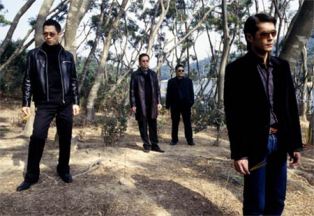 There are some pretty gnarly sights in Johnny To’s Election (most of ’em arrive in the massively disturbing final reel), but nothing in that complex, yet streamlined depiction of gangland politics could possibly prepare the viewer for the unthinkably grotesque set piece he pulls off in Triad Election‘s second act. And it isn’t that the barbaric acts on vivid display are unprecedented; indeed, far worse has been visited on audiences over the course of film history by everyone from Romero to Noe. It’s the surprise factor, and To’s masterful crescendoing of the savagery from mere psychological torture to physical torture to such grinding unpleasantness, that really sets the viewer on edge.
There are some pretty gnarly sights in Johnny To’s Election (most of ’em arrive in the massively disturbing final reel), but nothing in that complex, yet streamlined depiction of gangland politics could possibly prepare the viewer for the unthinkably grotesque set piece he pulls off in Triad Election‘s second act. And it isn’t that the barbaric acts on vivid display are unprecedented; indeed, far worse has been visited on audiences over the course of film history by everyone from Romero to Noe. It’s the surprise factor, and To’s masterful crescendoing of the savagery from mere psychological torture to physical torture to such grinding unpleasantness, that really sets the viewer on edge.
In pushing the violence as far as he does, To risks losing sight of what has, up until that point, been yet another measured examination of the Chinese underworld’s futile attempts to manage leadership succession without touching off gang warfare (and damn if they don’t come up short again!). But it’s a necessary jolt that, as David Chase often does on The Sopranos (one of this film’s multiple antecedents), reminds audiences that anyone who gets anywhere in any kind of organized crime must be capable of monstrous behavior – no matter how handsome or charismatic they are.
What’s especially fascinating about Triad Election (known everywhere outside of the U.S. as Election 2), and why it’s a much better film than its predecessor, is that the favorite to assume control of "The Society" this time out is Jimmy (Louis Koo), a college educated businessman who would rather move toward legitimacy than be pulled under by the triads. This is fine by Lok (Simon Yam), the reigning Chairman who is brazenly flouting Society tradition by lobbying for a second term. Few outside of Lok – who, at the end of the first film (Invisi-text time!) murdered short-lived co-Chairman Big D’s wife in front of his son in order to comfortably maintain his grasp on power – desire another term under his leadership; this includes the triad elders and the Chinese authorities, both of whom regard Jimmy as the logical choice to usher the triads into the 21st century.
After the visually clunky Election (it has its moments, but feels a tad rushed), it’s great to have a completely engaged To back behind the camera. He’s much more assured in his orchestration of the head-spinning twists and double-crosses that accompany the bloody quest for "The Baton" (the ancient, literal symbol of ultimate triad power), and, when he’s not completely creeping the audience out, it actually appears that he’s having some fun. There’s a nicely carried off bit early on in which the mobsters don a variety of masks (ranging from clowns to dogs) as a clumsy attempt to disguise their identities, and, though it’s not the most original conceit, To makes it his own by shooting his actors in extreme close-up. But any lightheartedness is repeatedly undercut by Robert Ellis-Geiger’s atonal score, which ably assists in placing the viewer on edge, particularly during the numerous assassinations and tortures.
Of the returning characters, Lok is still the most interesting; after his loathsome actions from the first movie, his efforts to comfort his teenage son are laughably pathetic. But Yam locates something recognizably human in this creature; when he realizes just how damaged his boy is after a youth gang confrontation, there’s a glimmer of compassion in the old man’s visage. It may arrive too late, but the reaction is almost redemptive (this time, when he says "Let’s go home", it sounds like he actually means it). Also back from the first picture is Wang Tian-lin as Uncle Teng, the closest thing the Society has to a Godfather. Teng, a seemingly untouchable figure who supported Lok in the previous election, is now poised to back Jimmy as a modernizing force for the crime syndicate. His attempts to maintain peace are, once again, amusingly half-hearted; an old dog like Teng understands and tacitly invites the inevitable spasm of violence. Whether Lok will allow him to stay above the fray this time is a different matter altogether.
Though To’s tendency toward brevity is admirable, it also seems ill-advised given the intricate, densely plotted material. Mob movies do well with length. Even if the filmmaker can condense the narrative into ninety-three minutes, the sprawl is kind of nice; whether it’s the mafia, the yakuza or the triad, these guys live in one big opera. Now that To has finally connected emotionally with these characters, it’d be cool to see him take a whack at the epic format.
Triad Election opens April 25th at the Film Forum in New York City. It should turn up in Los Angeles this June. We’ll keep you posted.